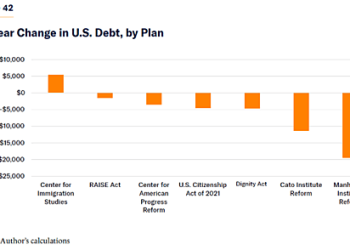Jamie Dimon sounded the alarm on the deficit and debt on the sidelines of the JPMorgan Tech Stars Conference in London, and Washington should pay attention. With the deficit at 7 percent of GDP and the debt soon to surpass 100 percent of GDP, the United States is facing a serious fiscal threat. As Dimon pointed out, deficits by their nature are inflationary and put the long-term stability of our economy at risk. He’s also right to warn that if we don’t act soon, we could be forced into crisis-mode decision-making, where legislators are forced to make tough choices at the worst of times. But while Dimon’s call for a Simpson-Bowles-style commission to address the deficit is well-meaning, it’s not enough.
To tackle this problem head-on, we need something more powerful. We need a fiscal commission modeled after the Base Realignment and Closure (BRAC) process, which has a track record of success in helping Congress to make difficult decisions by averting the blame.
The numbers don’t lie—deficits are unsustainable at these levels, and absent serious reform we’re headed toward an inevitable debt crisis. Washington has a long history of kicking the can down the road, and every year we wait the problem gets worse. Dimon is right to suggest that we need a commission empowered to act before the fiscal kettle boils over rather than waiting for spooked bondholders to put the heat on politicians.
Where I disagree with Dimon is in his call to resurrect the Simpson-Bowles model. The idea behind Simpson-Bowles was commendable—get a bipartisan group of members of Congress to offer recommendations that could bring the deficit under control. Unfortunately, it didn’t work. In 2010, the commission’s final report was never brought up for a vote in Congress. Even if it had been, the plan required widespread political consensus in an environment where gridlock was, and remains, the norm.
The failure of Simpson-Bowles wasn’t just bad timing; it was baked into the process. The commission had no mechanism to force Congress to act on its recommendations. It simply made proposals that lawmakers could—and did—ignore. As a result, despite the soundness of many of its ideas, Simpson-Bowles ultimately fell victim to the very partisanship it was trying to rise above.
If we’re going to get serious about fiscal reform, we need a different approach. One that gives lawmakers cover to make tough choices by taking the decision-making process out of the political cage fight arena. This is where the BRAC model comes in.
The BRAC process, used to close obsolete military bases, is widely regarded as a success. It worked because of its structure. Congress set big picture goals and left the details to the commission. Importantly, the BRAC commission consisted of independent experts, not elected officials. Its recommendations were self-executing, so long as the president approved, and unless Congress voted them down in a joint resolution of disapproval—a high bar that ensured action unless there was overwhelming opposition. This enabled Congress to lay the blame for decisions that were politically unpopular but economically necessary at the feet of the commission and the executive. The same approach could work for reducing structural deficits driven by unsustainable entitlement programs.
The House Budget Committee passed the Fiscal Commission Act of 2024 (H.R. 5779) earlier this year with bipartisan support. While a far cry from a BRAC-like fiscal commission, the proposal sets appropriate goals of stabilizing debt at no more than 100 percent of GDP while ensuring the long-term solvency of Medicare and Social Security. It’s a promising vehicle that could be strengthened if Congress gave it additional teeth by following the BRAC model. The bill has been sitting in waiting while lawmakers are campaigning for re-election. With a lame duck omnibus bill looming this December, legislators should seize the chance to set a powerful fiscal correction mechanism in motion.
The longer Washington delays the inevitable, the more inflationary pressure we will see from rising debt. But the real danger is that once the fiscal crisis implodes, we won’t have the luxury of thoughtful, measured responses. At that point, policymakers will be scrambling to fix the problem under duress, leading to hasty decisions and likely poor outcomes for the US economy, which will hurt our nation’s global standing in a tumultuous geopolitical era.
A BRAC-like commission offers a way out of this trap. It forces action by making it harder for lawmakers to do nothing. It gives Congress the opportunity to reject reforms but only if they muster a majority in both chambers, something far more difficult than simply avoiding tough votes, as we saw with Simpson-Bowles.
The time for action is now. We can’t afford another decade of inaction while the debt climbs to levels never seen in US history. If we want to preserve economic opportunity and avoid a debt-fueled disaster, we need a commission that Congress can’t ignore.
















